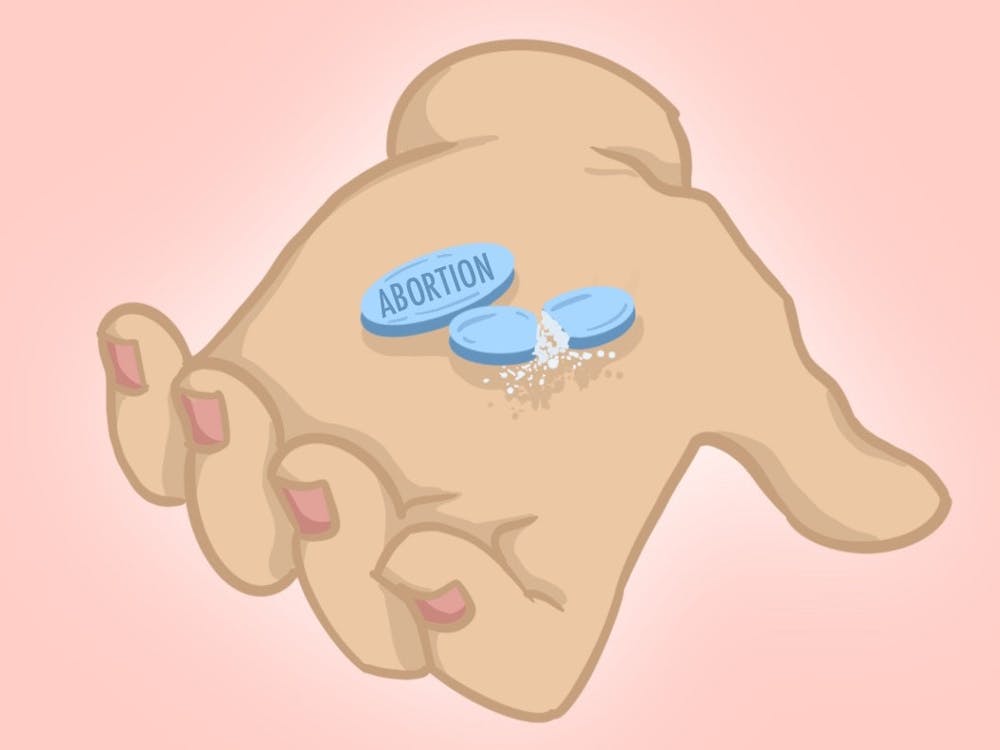A GOP-backed proposal banning abortion procedures after 15 weeks of pregnancy could change the narrative for women’s reproductive rights in Gainesville.
The Florida Legislature is expected to pass the controversial Fetal and Infant Mortality Reduction bill, HB5. It passed the House with a 78-39 vote Feb. 17.
On Jan. 11, the bill was proposed to the Florida Legislature by a board of Republican senators and representatives.
The bill is expected to pass and be signed by Gov. Ron DeSantis.
The bill’s sponsors believe it reflects the state’s commitment to protect children — born and unborn.
Under companion bills HB5/SB146, an abortion may be performed after 15 weeks only if “termination of the pregnancy is necessary to save the pregnant woman's life” or if the child has a “fatal fetal abnormality” that will “result in death upon birth or imminently thereafter.”
Current legislation in Florida allows abortions for up to 24 weeks of pregnancy.
The GOP rejected fervent proposals by Democrats to amend the bill, including an exception for pregnancies caused by rape or incest.
Disagreement among UF students
The lack of amendments to the bill worries pro-choice advocates like Rachel Wolfrey, a 21-year-old secretary of Planned Parenthood generation action and the public relations director of the UF College Democrats.
“If the bill passed, a lot of people are going to be forced to come to term with a pregnancy that they didn't want; a lot more children are going to go into the already crowded adoption system,” Wolfrey said.
As a female college student, the measure makes her worried for friends that do not have access to secure birth control options.
During her time at UF, Wolfrey has learned how to support multiple friends who made the burdensome decision to have an abortion, she said, and this ban has taken a toll on their well-being.
“When my first friend found out that she was pregnant, it was her freshman year of college, and she actually took the [pregnancy] test in front of me,” she said. “You never think it's going to happen to you. And then it does. And it's terrifying.”
She believes sponsors of the bill are hypocritical, and she urges the government to enact laws that give women as much time as they need to make this life-changing decision.
“The same people that are opposing the ‘my body, my choice’ argument are the exact same people that are saying that with the masks and vaccines and everything,” she said.
If the bill would pass, Wolfrey would raise funds for travel expenses to perform abortion procedures out of state for lower income, pregnant health care seekers.
Many pro-life students at UF argue, though, that the legislation protects fetal rights early on. Samantha Hoover, treasurer of Turning Point USA at UF, said she supports legislation banning abortions after six weeks, dubbed “heartbeat” abortion laws, but understands that a 15-week ban is more flexible and reasonable.
“At that point, your fetus is its own human being and you're committing murder,” the 19-year-old business administration major said.
Banning abortions after 15 weeks of pregnancy helps establish responsibility and promotes safe sex, Hoover added. She believes that the legislation leaves “plenty of time” for women to discover they are pregnant and receive an abortion, if they choose to.
Gainesville activism
The day after the bill was proposed, Planned Parenthood of South, East and North Florida organized a small protest outside of Sen. Keith Perry’s district office in Gainesville.
Community health educator and regional organizer of planned parenthood, Kai Christmas, organized the protest to participate in a statewide day-of-action.
“Perry historically votes against reproductive rights,” Christmas said.
They believe healthcare is anything you need for a happy, healthy life and brought to the protest a poster board of expenses that abortion seekers would be responsible for if they needed care from the next service-giving state, North Carolina.
“The entire southeastern region of the U.S. will be affected,” Christmas said. Surrounding states have limits or lack accessible abortion healthcare, so people come to Florida to receive care.
Protestors left the board with statistics from the Guttmacher Institute outside of Perry’s office. It showed an estimated $3000 to $4000 expense to seek abortion health care services outside the state.
The transition from 24 to 15 weeks is “ridiculous,” said Fred Sowder, a 51-year-old Gainesville resident of 25 years. Many women do not even realize they are pregnant until 15 weeks along, he added.
Sowder attended a reproductive rights and justice march in October 2021
He watched the GOP-controlled House debate on the Florida Channel with his 12-year-old daughter, Olive, in disbelief of the impassioned discourse.
“Women should have the right to choose,” he said. “To just watch the white men who are all up in the front of the room there in the House chamber, and then the minority women in the back, I mean, it was very telling. And a very striking picture to see there on TV.”
Debate in the House
Many Floridians seeking an abortion do not have the money nor resources to travel out of state and take time off school or work. Rep. Yvonne Hayes Hinson, D-Gainesville, believes this bill will disproportionately affect women with low incomes who already face marginalization.
“This bill will not prevent abortions,” she wrote in an email. “This bill will prevent safe abortions and this bill will prevent poor women from getting an abortion. Rich people will still have abortions and everyone else will suffer.”
The bills have mobilized pro-choice advocates who are passionate about women’s reproductive rights.
Rep. Hinson was the only Alachua County House representative to vote “nay” in the House vote finalized Feb. 17 at 12:02 a.m. She opposes HB5 because it sets unfair and unnecessary restrictions on a woman’s right to choose, and it is a cruel invasion of privacy, she wrote.
“I trust women to make decisions for themselves, not the legislature,” she wrote. “It is shameful that the Republican majority who advocate for small government, have passed this egregious government overreach.”
Despite the legislation’s controversial language and Democrats’ fervent dissent, she wrote it will “undoubtedly pass” in the Senate due to the Republican majority in the Florida Legislature.
For now, Roe v. Wade is still the law of the land, and although she worries about the future of the landmark Supreme Court ruling, Rep. Hinson views HB5/SB146 as unconstitutional.
Conservatives like Alachua County House Representative Charles ”Chuck” Clemons, R-Jonesville, wrote HB5 will not limit any woman in her choice to have an abortion for any reason, so long as she decides prior to 15 weeks.
“No woman is force[d] to carry a pregnancy to term because of the passage of this bill,” he wrote.
Alachua County’s Republican House and Senate representatives, Rep. Robert "Chuck" Brannan III, R-Lake City and Sen. Keith Perry, R-Gainesville, did not respond to The Alligator’s request for comment in time for publication.
If signed into law, the act will take effect this year on July 1.
The measure can be challenged by a state court if passed, which will likely end at the Florida Supreme Court.
Contact Carissa Allen at callen@alligator.org and follow her on Twitter @carissaallenn. Contact Thandie Brown at tbrown@alligator.org and follow her on Twitter @decidelioness.
Thandie Brown is a journalism student at UF and a reporter on the Metro beat. This is her first semester at the Alligator, and when she is not writing, she is photographing. You may find her in the Plaza of Americas dressed in a jeans jacket decorated with her favorite things.
Carissa Allen is a third-year journalism and political science double major. She is excited to continue her work on the Metro desk this semester as the East Gainesville Reporter. In her free time, you can find her scuba diving, working out or listening to a podcast.






